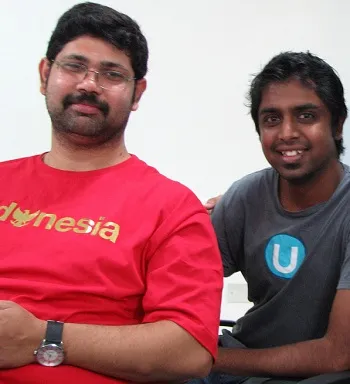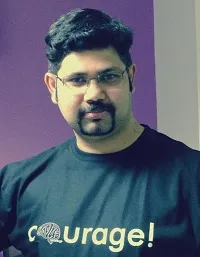Life after a co-founder quits

Three years and two months later into our startup, my dear Co-founder Santhosh Tuppad quit. He was 24 at the time he began this journey with the then 30-year-old guy (me).
I know exactly how one feels when one is 28. I was this age when I started out on my own the second time after my first unsuccessful stint at the age of 26. I feel Santhosh is going through something similar -- the bird within wants to fly solo and in its own style.
Santhosh and I met in February 2009 at a class I was teaching on software testing. He and I became close buddies during and after that. We either spoke for hours over the phone or were meeting at coffee shops discussing something or the other during the day, and hacking-testing in the night. That is how close we were.
So this awesome buddy and I, mentored by the other Co-founder Mohan, started our journey of Moolya together. Whenever I happened to meet my other friends or relatives they would enquire about Santhosh. You see, he had even made a place in the mind space of not only my family but other friends as well.
And one fine day, he quit!
Startup journey is a roller coaster ride. Wait, that’s incorrect. In a roller coaster, no matter whether you are up or down, you are always happy. Startup journey is more like giving birth to a child. There is pain you can’t bear but still you do because you look through the pain and see your child smile, cry and grow. Co-founders or not, any employee who shares the vision and pain of the startup co-own the startup.
Cloud of emotions
After Santhosh dropped the bombshell, the first few days I was very emotional. It was almost as if I was watching a movie in flashback. Our journey of ups and downs, the cool work we did together, all his hard work and contribution to Moolya, and then the heartbreaker, ‘I will miss you.’ How I controlled myself from breaking down that day.
Some people say business demands you to be less emotional. I get the good side and bad side of that coin. If I just saw this as purely business, I would just shake hands, wish him the best and move on. But this was more than that. It was a friend departing after we had built a dream together and saw it flourish.
A friend as a co-founder is a dangerous equation although it is a killer when it works
Why Moolya rose to great heights is because we are a bunch of friends who got together and made this company. When I say we – it includes Santhosh and a bunch of other people like Dhanasekar Subramaniam, Sunil Kumar, Parimala Hariprasad, Manoj Nair and Mohan Panguluri. None of us knew we existed till about 2008 and what united all of us was ‘testing’. That is the passion we carry for testing. All these testing rock stars turned great friends quit their jobs trusting the vision (because we all dreamed the vision together – something like an ‘Inception’ story!) over many meet-ups and conferences we organized.
We are self-funded and have grown to a size of 65 people (about 62 testers) and projects across the globe with highest repeat customers. We have testimonials and references of 98% of our customers. 98% of 50 odd customers we have worked with. That includes about 37 startups. This is possible in this era because of friends getting together and going for the kill.
However, business makes people very busy and no time for friendship. This is when the equation starts to change. Everybody is confused and is wondering; ‘is that my friend speaking or a businessman speaking?’ This is the most terrible emotion I have seen my friends go through.
I realized the importance of separating friendship and business (typing with burnt fingers). We need friendship to get to a point and if we continue to use friendship as a tool beyond that – it starts to eat into each other. I learnt the meaning of “What got you here won’t get you there.” Now, I see my friends as friends outside of business. Otherwise, there wouldn’t be any friends and there wouldn’t be any business because things would fall apart.

People want to know what happened
Everybody asked me the same question, “What happened?” I am glad Arnab Goswami didn’t put me on air to ask me, “India demands an answer. Tell us what happened?”
Santhosh wanted to quit, so he did. He is now working on his next startup and is going to rock. He is happy, I am happy and together we are happy. People don’t want to hear that. They want to hear a story. It is as if plain truth is unbelievable or I am hiding something from them. He is going to create more jobs and opportunities, why should anybody be sad about that?
The meaning of the term ‘business as usual’
It’s been more than a month now; and it is business as usual now. Not because we don’t miss him. Business demands to return to ‘business as usual’. Otherwise it shall cease to exist and the purpose of why we made this startup would be lost.
What did you say was the king of good times?
Days passed by, I randomly called him to say, “Hello, howdy?” to which he replied, “Lets meet.” We caught up at a bar sipping whiskey and wine talking as friends. After that meeting we went our respective ways. Hours passed, I picked up my phone to type a message: Today’s meeting made me feel so happy and we should be meeting like this more often. Thanks. Before I could type that, I got an SMS from him (my exact words, but with punctuation): Let us meet more frequently like this. Thanks for your time. Have a good evening ahead.
We spoke about a bunch of things which helped me learn something from him that was vital to make necessary changes. We plan to keep meeting like this and spend good times together. The king of good times is always friendship. No offence Vijay Mallya.
What’s your story? Hey, this YourStory is for your story!

About the author
Pradeep Soundararajan is the Kung Fu Panda and CEO of Moolya Software Testing. Moolya helps solve business problems through testing. Pradeep is experienced at getting fired, being considered dumb, redneck, rebel, being bankrupt, falling many times in his career and rising from ashes while (or, because) he was doing good work. You can read his personal blog and blog on testing. He writes about start-up life on yourstory.com







